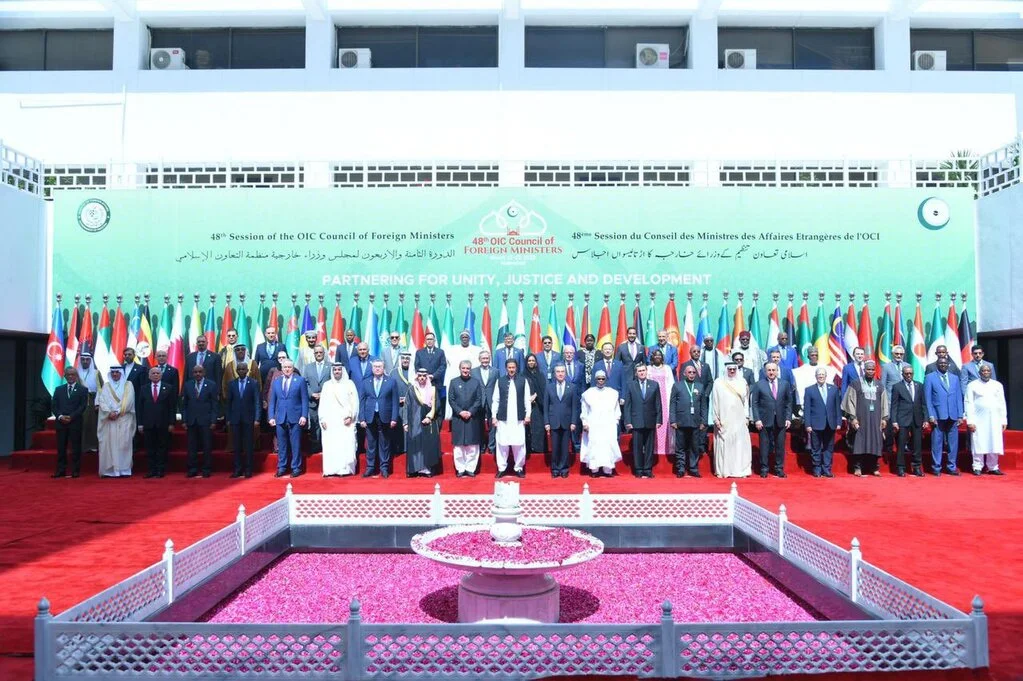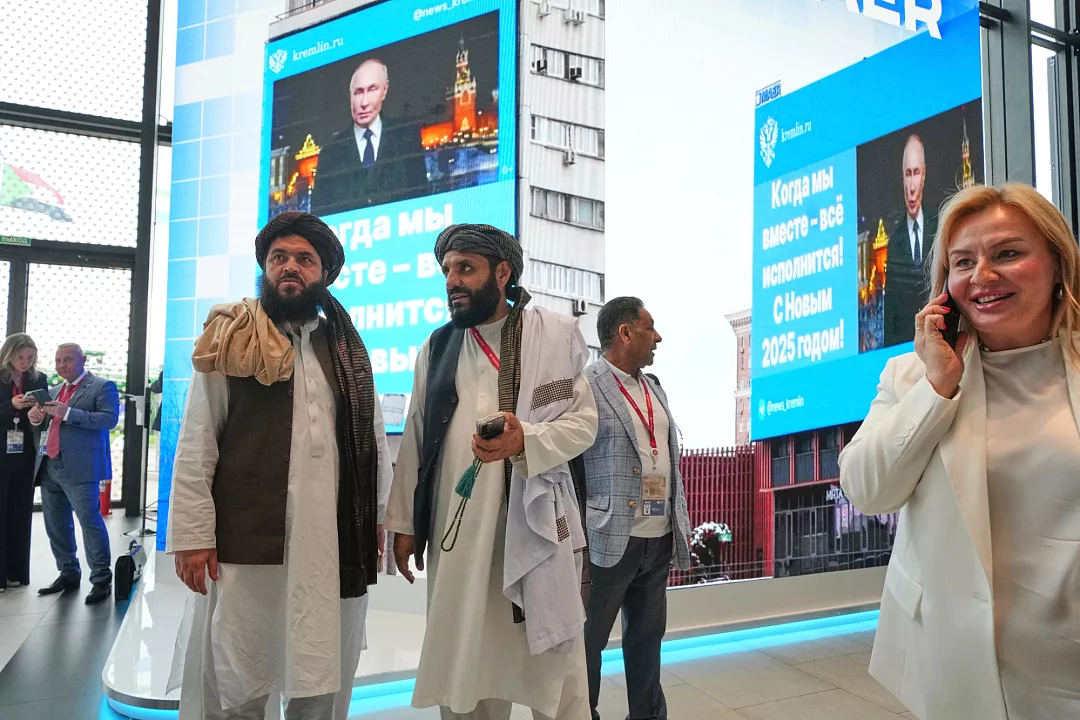‘Partnering for Unity, Justice, and Development’ was the theme that brought together the representatives of 57 Muslim countries in Islamabad. Pakistan hosted the two-day meeting of the Council of the Foreign Ministers of the Organization of Islamic Cooperation (OIC) on the 22nd and 23rd of March. Pulling together a strong display of Muslim Unity amongst rapidly changing regional and international dynamics stands as a big win for Pakistan. On issues of direct concern for Pakistan, for example, the emerging governance in Afghanistan and uncontrolled, careless Indian aggression, the OIC 48th CFM made clear its stance of standing with and behind Pakistan. Although the joint statement of the OIC session included and covered all issues of relevance and concern for the Muslim World, certain queries still stand given OIC’s countless failures in the past, specifically concerning the issues of Kashmir and Palestine. However, with Pakistan being the chair of the 48th CFM and the role of Pakistan’s Prime Minister Imran Khan regarding the initiatives such as Islamophobia, Covid-19 Response, specifically – the importance, the Islamabad Declaration holds for Pakistan is immense. Will it be materialized setting as a momentous precedent or not, is yet to be seen.
The Islamabad Declaration
OIC, the second largest intergovernmental organization, issued a joint statement on the conclusion of the 48th CFM, unanimously adopted as the Islamabad Declaration. The declaration sums up OIC’s stance on all important regional and international issues and conflicts, including but not limited to:
- Re-emphasizing the Palestinian cause, re-affirming ‘Al-Quds Al-Sharif’ as an integral part of Palestine.
- Renewing solidary for the people of Jammu and Kashmir, extending all-out support to their cause of ‘self-determination,’ and condemning grave human rights violations by India in J&K.
- Expressing ‘grave concern’ over ‘Pakistan’s airspace’ violation by India, calling India to ‘abide by International law,’ and take-up ‘joint probe’ of the ‘accidental’ missile launch incident.
- Welcoming the end of the conflict between Armenia and Azerbaijan.
- Condemning terrorist attacks on the Kingdom of Saudi Arabia and the UAE.
- Expressing concern over the situation in Ukraine.
- Advocating for the ‘sovereignty’ and integrity of Afghanistan and making every effort towards ‘sustainable peace’ in Afghanistan.
- Denouncing ‘systematic’ exclusion and discrimination against Muslims in India, especially over the policy targeting ‘Hijab.’
- Welcoming the adoption of March 15th as the International Day to Combat Islamophobia.
- Reaffirming the ‘role of women in the Islamic World.’
- Resolving to strengthen economic cooperation in the intra-Islamic sphere.
- Expressing concern over climate change and calling for action over ‘climate finance’ and ‘capacity building.’
Pakistan – The Pivot of the Islamic World
The Islamabad Declaration also commended Pakistan’s role as the ‘anchor’ of regional stability in South Asia and as the major advocate of the interests of the Muslim World. The hosting of the 48th CFM, in itself, is proof enough of the pivotal position Pakistan holds among the Islamic countries of the world. The holding of the CFM on the eve of the 75th Pakistan Day reaffirms the value Pakistan attaches to its Muslim brethren around the globe. The adoption of International Day to Combat Islamophobia by the UN on Pakistan’s call is one case in point where Pakistan displayed its commitment to Islam and the Islamic countries.
Pakistan’s Balancing Act
Pakistan invited Chinese Foreign Minister, Wang Yi, to attend the OIC’s session as a special guest, while a representative from the United States also attended the CFM. On one hand, this strikes as the perfect balancing move since Pakistan’s Prime Minister has very clearly stressed how important it is for all Muslim countries to not be dragged into great power rivalries and blocs. On the other hand, bringing China into a forum of the Islamic countries helps bridge a connection between the Muslim World and the uncontested rising power, not to mention how this will also pave way for economic engagement. Pakistan very responsibly took the role of a liaison between China and the Muslim countries.
Afghanistan on OIC’s Agenda
Afghanistan remained on top of the 48th CFM’s agenda.
The ‘Humanitarian Trust Fund’ for Afghanistan was launched one day before the official proceedings commenced. This fund is the Muslim World’s effort to keep providing Afghanistan with the humanitarian assistance it needs right now. The OIC further called for an inclusive government in Afghanistan where all ethnicities are represented and which can materialize the dream of lasting and sustainable peace for the Afghan people. An emphasis was laid on respect for human rights, including women’s rights. The Council spoke against the unjust freezing of Afghan assets as well. Right after the session was concluded, China’s Foreign Minister visited Afghanistan, which turns out to be the ‘first high-level visit’ since the Interim Government took over.
Considering the fact that Afghanistan remained on top of the OIC 48th CFM, the absence of Afghanistan’s interim Foreign Minister, Amir Khan Muttaqi, from the session was also observed. Though representatives from Afghanistan attended the CFM, the absence of Interim Foreign Minister Muttaqi conveys a rather conscious move, and rightly so. Here, drawing on the role effectiveness of the OIC, certain pertinent queries are awaited to be answered.
Wouldn’t the bold move of bringing the Afghan Interim Foreign Minister to attend the moot, placing him among the delegates, and in the family photo have sent a positive message contributing to the process acceleration of legitimate recognition of Afghanistan’s Interim Government? Wasn’t a rather ‘Look West’ policy influenced the initiative here? Isn’t it naive of the ‘OIC-led Muslim Ummah’ to expect the West to take the lead in recognizing Afghanistan’s Interim Government? Will the OIC be able to take the plunge based on the solidarity of the Muslim Ummah to recognize the Afghan Interim Government in days to come? Certainly, Afghanistan is going to serve as a test case for OIC’s revival after the countless failures.
‘NO’ to Indian Aggression
While India’s reaction to the OIC session is once again a sheer display of its rivalry with China, both the OIC and China have made it clear through the forum of the 48th CFM that India’s aggression is condemned to the highest degree. The issue of the ‘accidental’ missile launch by India and a clear-cut violation of Pakistan’s airspace remained the highlight of the OIC session. India was called upon to carry out a fair joint investigation and to restrain its aggressive posture in the future. India’s credibility, for sure, has been tarnished after this incident and OIC’s condemnation furthered this realization.
A consensus was harnessed among the Muslim World (and also China) that what India is doing in Jammu & Kashmir particularly and in the region generally is not acceptable.
As an end note, OIC’s 48th session in Islamabad not only established the unity of the Muslim World but also erected the image of Pakistan as a pivot and a very important member of the OIC. For the first time, OIC spoke very clearly on issues that concern the regional stability of South Asia. It remains to be seen, however, that will OIC be able to raise its stature from a popularly-claimed defunct body to a platform that is perfectly capable of voicing issues and concerns in a way that promotes action?




![Afghan men search for victims after a Pakistani air strike hit a residential area in the Girdi Kas village, Nangarhar province on February 22, 2026. [Aimal Zahir/AFP/Getty Images]](https://southasiatimes.org/wp-content/uploads/2026/02/gettyimages-2262391441.webp)

